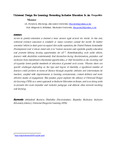| dc.description.abstract | Access to quality education is deemed a basic human right around the world. To this end, universal primary education is available in many countries around the world. To bolster countries’ efforts in their quest to support this noble aspiration, the United Nations Sustainable Development Goal 4 whose stated aim is to “ensure inclusive and equitable quality education and promote lifelong leaning opportunities for all ”. Notwithstanding such noble efforts, learners with disabilities unfortunately find themselves facing discrimination, prejudice and exclusion from mainstream educational opportunities, or find themselves at the receiving end of arguably lower quality standards of education if granted such access. Whereas there are specific challenges depending on the type and degree of disability, a significant number of learners could perform in terms of literacy through empathic attitudes and interventions by teachers, coupled with improvements in learning environments, content delivery and more effective modes of engagement. This position paper explores the efficacy of Universal Design for Learning (UDL) as a novel approach to Inclusive Education in Kenya, and in so doing seeks to promote this more empathic and inclusive pedagogic and didactic ethos towards teaching and learning. | en_US |

